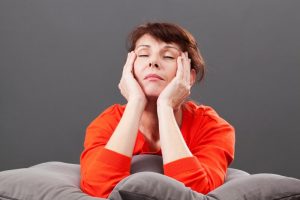Examining the Link Between Hot Flashes and OSA in Women
October 20, 2021

Obstructive sleep apnea (OSA) is a condition that afflicts an estimated 22 million Americans and is generally believed to be vastly underdiagnosed in the general population. The difficulty in diagnosis originates in the fact that many of the condition’s symptoms can be misattributed to a number of ailments. In addition to this, the majority of general practitioners do not know how to properly screen for the condition—resulting in a weak first line of defense against the disorder.
For women, the situation is compounded by an all-too-common issue they experience when seeking medical care: their symptoms tend to deviate from the “classic” symptoms found in men. For example, chronic snoring, the most common tell-tale sign of sleep apnea, is frequently replaced by other sleep disruptions in women.
Thankfully, more and more studies are being published to enhance practitioners’ knowledge on how OSA reveals itself in, and impacts, women.
How Does Menopause Impact Sleep and Risk of OSA?
Women become particularly vulnerable to OSA when they hit a pivotal moment in their lives: menopause. Most women begin experiencing menopause in their late 40s-early 50s. Menopause occurs once a woman’s ovaries stop producing estrogen and progesterone, the hormones associated with ovulation. These hormonal changes can disrupt a woman’s ability to sleep.
How? Well, estrogen plays a role in the regulation of the sleep-wake cycle in women. It helps maintain a low body temperature at night, and it even acts as an antidepressant. Outside of that understanding, the research needed to truly grasp the impact of estrogen and progesterone on sleep is ongoing; but we do know that 40 percent of women experience sleep disruption due to the effects of menopause. These sleep disruptions include, but are not limited to, hot flashes, insomnia, obstructive sleep apnea, restless leg syndrome, and mental health ailments.
The Link Between Hot Flashes, Night Sweats, and OSA
Interested in better understanding the connection between OSA and menopause, a group of researchers set out on a journey that would reveal ground-breaking results.
The study, published in 2017, leveraged self-reported data of 1,691 women. This data revealed that moderate-severe hot flashes and night sweats, which are experienced by up to 80 percent of menopausal women, are linked to an equally moderate-severe risk of obstructive sleep apnea, regardless of a woman’s blood pressure levels or BMI (two of the most common health conditions associated with OSA).
And while those results still remain interesting and relevant in 2021, what’s even more telling is that two years after their clinical consultation, 65 percent of those women who were determined to be intermediate to high risk remained undiagnosed with the sleep disorder—highlighting the medical field’s shortcomings at being able to identify risks of, and properly test for, OSA in women.
Finding Treatment
Regardless of your gender, age, or circumstances, you deserve restful, restorative sleep. If your hot flashes and night sweats become unbearable, disrupting your sleep on a consistent basis, you may benefit from consulting a sleep physician who can pinpoint how and why you’re experiencing disrupted sleep and help you establish a treatment plan.
Sleep physicians can also determine whether or not you’re suffering from obstructive sleep apnea. In addition to hot flashes and night sweats, women who suffer from OSA also tend to experience:
- Mood disturbances
- Depression and/or anxiety
- Morning headaches
- Insomnia
- Chronic fatigue
- Restless leg syndrome
- Occasional snoring
Any type of unusual symptom should not be overlooked. Bringing these symptoms to the attention of a sleep physician could save your life in the long run.
If diagnosed with OSA, a dental sleep medicine doctor—like Dr. Kent Smith—can fit you with a non-invasive, portable, and comfortable sleep device called an oral appliance. An effective CPAP-alternative, oral devices treat mild, moderate, and in many cases, even severe sleep apnea.
Ready to regain control of your rest? Schedule your appointment with Sleep Dallas today!
